#Logistics Software
Explore tagged Tumblr posts
Text
5 Ways Freight Forwarding Software Can Boost Your Business's Efficiency

In today's fast-paced logistics industry, efficiency is key to success. One tool that can significantly enhance efficiency in your business operations is freight forwarding software. But what exactly is freight forwarding software, and how can it revolutionize your logistics processes? This blog post will explore the five key ways in which freight forwarding software can boost your business's efficiency, from streamlined communication to cost savings.
Streamlined Communication
Centralized Platform for Communication A major benefit of using freight forwarding software is its centralized platform, for all communication regarding shipments. This ensures that everyone involved, from suppliers to carriers and customers stays informed and connected at all times.
Real-Time Tracking and Updates: The real time tracking features of freight forwarding software allow you to keep tabs on your shipments throughout their journey reducing the chances of misunderstandings and delays.
Reduction of Communication Errors and Delays: By automating communication processes freight forwarding software helps minimize errors and prevents delays caused by miscommunication leading to operations.
Automated Processes
Automated Documentation and Paperwork Handling paperwork manually can be time consuming and prone to errors. Freight forwarding software automates tasks like generating bills of lading and invoices making the paperwork process more efficient.
Integration with Customs Regulations and Compliance: Compliance with customs regulations is essential in shipping. Freight forwarding software integrates, with customs databases to ensure your shipments meet all requirements.
Reduction of Manual Data Entry and Human Error: Automating data entry tasks reduces the likelihood of error improving the accuracy and efficiency of your logistics operations.
Improved Planning and Optimization
Route Optimization and Shipment Consolidation: Freight forwarding software offers features like route optimization and shipment consolidation, enabling you to plan the most efficient delivery routes and reduce transportation costs.
Forecasting and Demand Planning Features: To stay ahead of demand, freight forwarding software provides forecasting tools that help you anticipate market trends and plan your logistics operations accordingly.
Capacity Management and Resource Allocation: By optimizing capacity and allocating resources effectively, freight forwarding software ensures that your business operates at its fullest potential, maximizing efficiency.
Enhanced Customer Service
Transparency and Visibility for Clients: With freight forwarding software, you can provide your clients with real-time visibility into their shipments, fostering trust and transparency in your business relationships.
Quicker Response Times to Inquiries: The ability to access up-to-date information on shipments enables you to respond promptly to customer inquiries, enhancing customer satisfaction and loyalty.
Customizable Reporting and Analytics for Client Insights: Freight forwarding software offers customizable reporting and analytics tools that provide valuable insights into your clients' shipping patterns and preferences, allowing you to tailor your services to their needs.
Cost Savings
Reduction in Administrative Costs: By automating administrative tasks, freight forwarding software reduces the need for manual input, saving time and money on administrative work.
Avoidance of Penalties through Compliance Automation: Compliance errors can result in costly penalties. Freight forwarding software helps you avoid these penalties by automating compliance processes and ensuring regulatory adherence.
Optimization of Resources Leading to Lower Operational Costs: Through efficient resource allocation and capacity management, freight forwarding software optimizes your resources, minimizing operational costs and maximizing profitability.
Conclusion
In conclusion, freight forwarding software is a powerful tool that can transform your logistics operations and boost your business's efficiency in numerous ways. From streamlined communication and automated processes to improved planning and optimization, enhanced customer service, and cost savings, investing in freight forwarding software is a wise decision for any business looking to stay ahead in the competitive logistics industry. So why wait? Upgrade your business today and experience the benefits firsthand!
#FreightForwarding#LogisticsTech#SupplyChainSolutions#BusinessGrowth#freight forwarding software#logistics software
2 notes
·
View notes
Text
Freight Cost in Steel Industry
A Detailed Analysis of Increase in Freight Cost in Steel Industry
Are you searching for efficient ways to reduce freight costs in steel industry logistics operations? Companies with Freight as a crucial part of their business must deal with the continuous rise in transportation of steel industry logistics as a whole.
This is why finding best ways to transport steel to ensure freight cost optimization is becoming critical. It eventually improves the supply chain procedures and saves money for businesses.
Strategies for logistics cost control can range from streamlining inventory levels, revising smarter shipping networks, providing better processes, improving relationships between suppliers and third parties, etc.
Before looking for the best ways to transport steel cost-efficiently, it is critical to understand the reasons that lead to the rise in Freight logistics costs in the steel industry.
This blog post highlights the reasons behind the ongoing rising Freight costs in the steel industry and ways to reduce freight costs.

#software#logistics#fretron#tms#transportation management software#logistics software#steel industry#Freight Cost
2 notes
·
View notes
Text
Revolutionizing Freight: How AI and Automation are shaping the Future of Logistics | QuickMove Freight Forwarding Software
AI and automation are transforming the logistics industry by streamlining operations, enhancing route optimization, and enabling real-time tracking. From predictive analytics to autonomous delivery solutions, these technologies are driving efficiency, reducing costs, and improving customer satisfaction. Discover how the future of freight is being revolutionized with intelligent, data-driven innovations.
Visit Us:- Freight Forwarding Software
#logistics software#freight software#freight forwarding software#software for freight forwarding software
1 note
·
View note
Text
Moving Software for Moving Companies
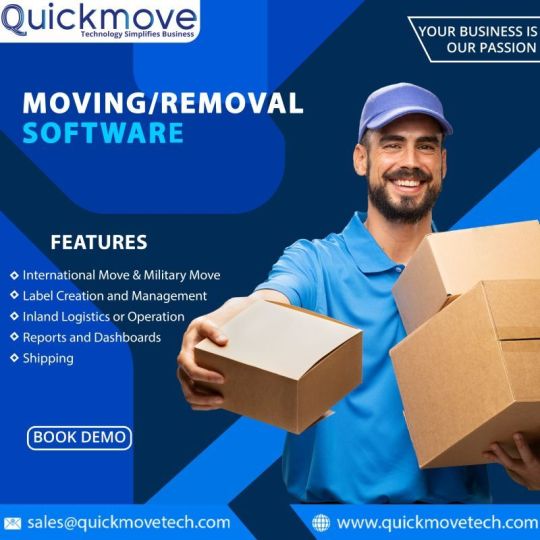
Enhance customer relationships by using specialized organizational software. Replace sticky notes and filing cabinets with digital solutions that accurately quantify and categorize data, making it accessible across all departments.
Free Demo
See how moving software can boost your team’s effectiveness and productivity. A centralized database for emails, appointments, correspondence, and phone calls simplifies internal communication and improves overall efficiency.
Request a Free Demo
Collaboration and Information Sharing
Switching to digital operations improves collaboration. Avoid the pitfalls of paper-based updates by using moving software as a central hub for all activity, ensuring all employees access the most current information.
Customer Satisfaction Levels Are Higher
By eliminating paper-based processes, you can respond to customer inquiries and fulfill document requests more quickly. Clients will appreciate the efficiency and technological advancement, leading to higher satisfaction levels.
Download Mobile App on Play Store Download Mobile App on App Store
0 notes
Text
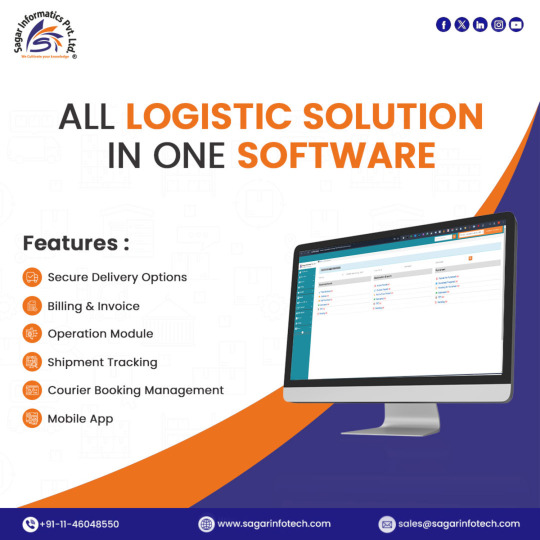
A Logistics Management System is a powerful tool designed to streamline and optimize the movement of goods, inventory, and supply chain operations. Whether you're managing warehouse logistics, transportation, or last-mile delivery, an advanced system ensures efficiency, cost savings, and real-time tracking. Businesses can automate processes, reduce manual errors, and improve decision-making with data-driven insights.
#International Courier Management#International Courier Software#Courier Management System#Courier Management Software#Courier Software#Logistics Management System#Logistics Management Software#Logistics Software
0 notes
Text
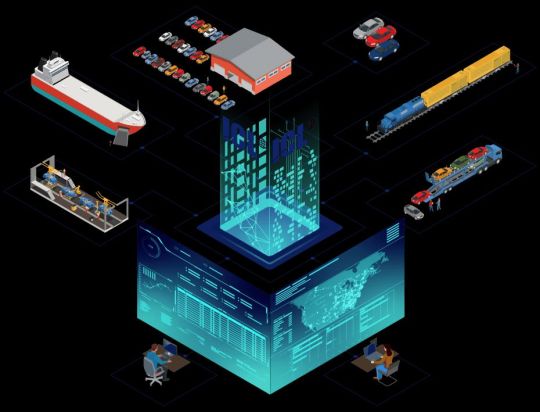
The logistics supply chain can be complicated, but it doesn’t have to be. With ICL, experience centralized data for end-to-end visibility and unlock new insights into your operations, no matter where you may be in the supply chain.
#logistics software#supply chain software#transportation software#railway logistics software#visibility software
0 notes
Text
JBM's International Freight Forwarding Software
#logistics companies#freight and forwarding#transport and logistics#air freight#airport freight#business logistics#freight transport#ocean freight#shipping and logistics#freight brokering#freight ocean#lcl shipping#sea freight#transportation management#transport logistics#air shipping#freight forwarding service#transport management systems#shipping logistics companies#global transports#transport and logistics companies#warehouse transportation#transportation logistics companies#logistics software#transportation software#shipping logistics#supply chain operator#transport and logistics services#carrier shipper#transport service logistics
0 notes
Text
Freight forwarding ---Global Business Support
In the high-stakes world of freight forwarding, where time is money and precision is nonnegotiable, software has emerged as the ultimate game-changer. Are you leveraging the right tools to outpace the competition?" How Software Revolutionizes the Freight Forwarding Business: A Global Perspective The freight forwarding industry operates as the backbone of global trade, ensuring goods reach their destinations on time, safely, and efficiently. However, as supply chains grow m complex and customer expectations rise, traditional methods of managing operations often fall short. Enter software solutions—an innovation that transforms freight forwarding into a seamless, scalable, and efficient proce In this blog, we’ll explore how freight forwarding software is driving a paradigm shift in the industry and the global business support features that make all the differences
1. Enhanced Operational Efficie Gone are the days of managing shipments through spreadsheets and manual processes. Freight forwarding software streamlines operations by automating repetitive tasks such as: Document Generation: Automated invoices, bills of lading, and compliance forms save time and reduce errors. Shipment Tracking: Real-time tracking ensures transparency for both businesses and customers. Customs Management: Pre-built compliance modules simplify customs documentation and clearance processes. By integrating these functionalities into a centralized system, freight forwarders can eliminate bottlenecks, reduce manual labor, and boost productivity.
2. Improved Accuracy and Reduced Errors Manual processes are prone to human errors, which can lead to costly delays or compliance issues. Freight forwarding software mitigates these risks through: Data Validation: Ensuring the accuracy of shipment details before processing. AI-Powered Predictions: Anticipating potential risks such as delays, enabling proactive mitigation. Integrated Platforms: Consolidating data from various sources (warehouses, carriers, and customs) into one accurate and reliable system.
3. Scalability for Global Operations In the global trade arena, scalability is critical. Freight forwarding software is designed to accommodate growth by supporting: Multi-Currency and Multi-Language Support: Catering to clients and partners across the globe. Global Carrier Integration: Offering seamless connections with international shipping line airlines, and trucking companies. Regulatory Compliance Updates: Staying ahead of evolving trade regulations in multiple countries.
4. Superior Customer Experience In today’s customer-centric market, providing exceptional service is a differentiator. Softwa empowers freight forwarders to: Offer Real-Time Updates: Clients can track their shipments in real-time, improvi transparency. Streamline Communication: Automated notifications and integrated communication too enhance client interaction. Provide Self-Service Portals: Allowing customers to book, track, and manage shipments independently.
5. Data-Driven Decision Making Freight forwarding software comes with robust analytics capabilities that help businesses make informed decisions. Features include: KPI Dashboards: Visualizing key performance metrics in real-time. Forecasting Tools: Using historical data to predict future trends. Operational Insights: Identifying inefficiencies and areas for cost optimizati 6. Sustainability and Green Logistics Environmental consciousness is increasingly influencing global trade. Freight forwarding software helps businesses embrace sustainability by: Optimizing Routes: Reducing fuel consumption and carbon footprints. Eco-Friendly Reporting: Providing insights into emissions and suggesting greener alternatives. Digitization: Minimizing paper use by automating documentation. Conclusion The freight forwarding industry is evolving rapidly, and staying competitive means embracing the technological revolution. Software solutions not only streamline operations but also provide a strategic edge in managing global complexities, enhancing customer experience, and fostering sustainable practices. Are you ready to transform your freight forwarding business? Invest in the right software today and position your business for unparalleled success in the global market
0 notes
Text
How Logistics Software for Transportation Enhances Route Optimization

In today’s fast-paced and demand-driven logistics environment, the ability to deliver goods efficiently is paramount. As customer expectations rise, and costs increase, logistics software for transportation has become crucially important. It helps improve route optimization. This article explores how advanced logistics software empowers transportation businesses to streamline their operations, minimize costs, and improve delivery efficiency.
Introduction to Route Optimization in Logistics
Route optimization is finding the best path for vehicles to deliver goods. It looks at distance, fuel use, traffic patterns, and delivery times. In the logistics industry, optimizing routes is important. It helps save costs and improves customer satisfaction with timely deliveries.
Traditional route planning methods, often manual and static, fail to account for the dynamic nature of transportation. Logistics software powered by advanced algorithms and real-time data integration provides the agility required to adapt to evolving conditions, ensuring optimal performance.
5 Key Features of Logistics Software for Route Optimization
Logistics software has changed how we plan and carry out transportation routes. It is important in an industry that values precision and efficiency. By leveraging cutting-edge technology, these platforms tackle complexities such as traffic congestion, multiple delivery stops, and fluctuating demand with unparalleled accuracy.
Here are the main features of logistics software. These tools help businesses improve their routes and boost transportation efficiency.
1. Dynamic Route Planning
Unlike static planning methods, logistics software leverages dynamic route planning capabilities. It accounts for real-time variables such as traffic congestion, weather conditions, and road closures to adjust routes dynamically. This ensures minimal delays and reduces fuel consumption.
2. Multi-Stop Optimization
Managing routes with multiple stops can be a logistical nightmare without the right tools. Logistics software employs sophisticated algorithms to sequence stops in the most efficient order, minimizing travel distance and maximizing vehicle utilization.
3. Real-Time Tracking and Updates
Modern logistics software integrates with GPS and IoT devices, enabling real-time tracking of vehicles. This feature not only ensures better visibility for stakeholders but also allows immediate rerouting in case of disruptions.
4. AI-Powered Predictive Analytics
Predictive analytics driven by AI helps in forecasting demand patterns, vehicle availability, and potential bottlenecks. By proactively addressing these factors, businesses can enhance overall route efficiency.
5. Scalable Solutions for Growing Operations
As businesses grow, their transportation needs become more complex. Developers design logistics software to scale seamlessly, accommodating larger fleets, increasing delivery volumes, and expanding geographic coverage without compromising on performance.
5 Benefits of Logistics Software in Route Optimization
The adoption of logistics software for route optimization offers significant advantages that go beyond mere operational improvements. By using advanced technologies and real-time data, businesses can gain real benefits. These benefits can boost profits, simplify processes, and improve customer experiences. Here are the key benefits that make logistics software indispensable for modern transportation operations.
1. Cost Reduction
Fuel consumption and driver wages constitute a significant portion of transportation costs. Optimized routes reduce unnecessary mileage and idle time, leading to substantial cost savings.
2. Improved Delivery Times
By leveraging real-time data and efficient routing, logistics software ensures that goods reach their destinations within stipulated timeframes, enhancing customer satisfaction.
3. Enhanced Sustainability
Optimized routes lead to reduced fuel usage and lower carbon emissions, aligning transportation operations with sustainability goals.
4. Better Resource Utilization
With logistics software, companies can maximize the utilization of their fleet and workforce, reducing wastage and improving operational efficiency.
5. Increased Customer Satisfaction
Features like accurate ETAs and proactive communication with customers build trust and reliability. These are key to keeping business in competitive markets.
Technologies Powering Modern Logistics Software
Modern logistics software comes from the smooth use of advanced technologies. Each technology helps improve efficiency and adaptability.
These technologies help with smart decision-making, real-time tracking, and data sharing. They are essential for strong and flexible logistics solutions. Here’s a closer look at the technologies that power today’s cutting-edge logistics software.
1. Artificial Intelligence (AI)
AI algorithms analyze large datasets to identify optimal routes, predict delays, and automate decision-making processes, reducing human intervention.
2. Machine Learning (ML)
ML learns from past data. It improves route planning accuracy over time. It also adapts to changes in traffic or demand.
3. Internet of Things (IoT)
IoT-enabled devices, like GPS trackers and telematics systems, give real-time information about vehicle performance and location. This helps make accurate route adjustments.
4. Cloud Computing
Cloud-based logistics software ensures seamless data sharing across stakeholders, enabling collaboration and scalability for distributed operations.
Challenges Addressed by Logistics Software in Route Optimization
The logistics industry faces a myriad of challenges that can hinder operational efficiency and customer satisfaction. From fluctuating demand to compliance with strict regulations, these obstacles require innovative solutions.
Logistics software directly addresses these problems. It offers automated and smart tools to solve key challenges in route optimization. Here’s how it addresses key hurdles in transportation management.
1. Managing Peak Demand
During seasonal peaks or unexpected surges in demand, manual route planning can falter. Logistics software automates the process and ensures that users allocate resources efficiently.
2. Reducing Empty Miles
Empty miles, where vehicles return without cargo, result in wasted fuel and time. Logistics software identifies backhaul opportunities to mitigate this issue.
3. Compliance with Regulations
Transportation companies often need to adhere to various regulations, including weight limits and driver working hours. Logistics software ensures compliance by factoring these constraints into route planning.
4. Adapting to Last-Minute Changes
Logistics operations are inherently unpredictable. Advanced software solutions provide the flexibility to adapt to last-minute order modifications or unexpected disruptions.
Case Study: Transforming Delivery Operations with Advanced Logistics Software
Client:
A leading e-commerce retailer facing challenges with on-time deliveries and rising operational costs.
Challenge:
Managing more than 500 deliveries each day in cities and suburbs. This is hard due to heavy traffic and last-minute order changes.
Solution:
The retailer implemented logistics software equipped with dynamic route planning and real-time tracking. This software integrated seamlessly with their existing order management system, allowing automated scheduling and optimized routing.
Results:
On-Time Delivery Rates:
Improved by 35% within three months.
Cost Reduction:
Achieved a 20% reduction in fuel expenses.
Customer Satisfaction:
Received a 15% increase in positive customer feedback, thanks to accurate ETAs and proactive communication.
Logistics software for transportation has become a cornerstone for efficient and sustainable logistics operations. By enhancing route optimization, businesses can achieve substantial cost savings, better resource utilization, and higher customer satisfaction. As technology keeps changing, logistics software will improve. This will help companies stay ahead in a competitive market.
For businesses that want to improve their transportation operations, investing in strong logistics software is essential. It is a key strategy for success.
#logistics software#last mile delivery#last mile tms#route planning software#route optimization solutions
0 notes
Text
0 notes
Text
Unlocking Logistics Efficiency: How ERP-based Freight Forwarding Software Empowers Freight Forwarders

Introduction:
In the ever-evolving world of logistics, staying competitive and maximizing operational efficiency is crucial for freight forwarders. To meet these challenges head-on, the adoption of technology has become imperative. In this blog post, we will explore the transformative power of ERP-based freight forwarding software and shed light on why freight forwarders need to be aware of its impact on logistics efficiency.
Introduction to Freight Forwarding Software and Its Role in Logistics:
Freight forwarding software serves as a digital backbone for freight forwarders, streamlining their operations and optimizing the movement of goods across the supply chain. This software automates manual tasks, facilitates seamless coordination among stakeholders, and enhances visibility into shipments. It acts as a central hub, empowering freight forwarders to efficiently manage inventory, bookings, documentation, invoicing, and more.
Benefits of Using ERP Freight Forwarding Software in the Freight Forwarding World:
Implementing an ERP-based freight forwarding software brings forth a myriad of benefits for freight forwarders:
a. Streamlined Operations: By automating repetitive tasks and integrating processes, ERP software enables freight forwarders to streamline their operations, reducing manual errors and saving time.
b. Enhanced Visibility: Real-time visibility into shipment status, inventory levels, and key milestones enables freight forwarders to make informed decisions, proactively address issues, and optimize supply chain efficiency.
c. Improved Customer Service: ERP software allows freight forwarders to provide accurate and timely information to customers regarding the status of their shipments, fostering transparency and building trust.
d. Data-driven Insights: ERP systems capture and analyze vast amounts of data, providing valuable insights for freight forwarders to identify trends, optimize routes, reduce costs, and improve overall performance.
The Challenges of Implementing Freight Forwarding Systems:
While the benefits of ERP-based freight forwarding software are abundant, implementing such systems comes with its own set of challenges:
a. System Integration: Integrating ERP software with existing systems and processes can be complex, requiring careful planning and collaboration with IT teams and stakeholders.
b. Data Migration: Transferring data from legacy systems to the new software can be a time-consuming process that necessitates thorough data cleansing and validation.
c. Change Management: Introducing new technology often requires a change in workflow and mindset. Proper change management strategies should be implemented to ensure smooth adoption and user acceptance.
d. Training and Support: Comprehensive training and ongoing support are crucial to help freight forwarders leverage the full potential of the software and overcome any hurdles they may encounter.
Common Features of ERP Freight Forwarding Software Used by Freight Forwarders:
ERP-based freight forwarding software typically offers a range of features tailored to the specific needs of freight forwarders:
a. Shipment Tracking and Tracing: Real-time tracking of shipments, enabling freight forwarders to monitor and update customers on the status of their goods.
b. Document Management: Centralized storage and management of shipping documents, ensuring easy access and compliance with regulatory requirements.
c. Financial Management: Tools to handle invoicing, billing, and financial transactions, simplifying the financial aspects of freight forwarding operations.
d. Reporting and Analytics: Robust reporting capabilities and data analysis tools that provide insights into key performance indicators, enabling data-driven decision-making.
Conclusion:
Embracing ERP-based freight forwarding software is a strategic move for freight forwarders seeking to optimize logistics efficiency. By automating processes, enhancing visibility, leveraging data-driven insights, and overcoming implementation challenges, freight forwarders can unlock new levels of efficiency, improve customer service, and gain a competitive edge in the industry.
Understanding the benefits and features of ERP-based freight forwarding software empowers freight forwarders to make informed decisions when it
2 notes
·
View notes
Text
Route Optimization Software Market to Grow at 11.56% CAGR, Revolutionizing Logistics and Transportation

Route Optimization Software Market: Key Trends, Growth Drivers, and Future Outlook
The global Route Optimization Software Market is experiencing rapid growth, driven by the increasing demand for logistical efficiency and cost-saving solutions. As businesses around the world continue to embrace digital transformation, route optimization software has emerged as a critical tool in the arsenal of enterprises that rely on transportation and delivery. From large multinational corporations to small and medium-sized businesses, route optimization software helps organizations plan and execute delivery routes more efficiently, reducing costs, time, and carbon emissions.
Market Definition and Revenue Projections
The Route Optimization Software Market was valued at USD XX billion in 2023 and is projected to grow at a steady pace, reaching USD XX billion by 2032, expanding at a compound annual growth rate (CAGR) of 11.56% from 2024 to 2032. This robust growth is fueled by the rising need for operational efficiency in industries such as transportation and logistics, food delivery services, ride-hailing, and retail. The increasing complexity of supply chains, coupled with the pressure to reduce operational costs, has made route optimization solutions indispensable for businesses.
Request a Free Sample (Full Report Starting from USD 1850): https://straitsresearch.com/report/route-optimization-software-market/request-sample
Route Optimization Software Market Categorization
The Route Optimization Software Market can be categorized across several parameters, including enterprise size, deployment model, industry verticals, and solutions offered.
By Enterprise Size
Large Enterprises: Large organizations with complex and expansive logistics operations are major consumers of route optimization software. These companies operate on a global scale and require sophisticated software to handle complex, multi-location deliveries and real-time data analysis.
Small and Medium-Sized Enterprises (SMEs): Small and medium-sized businesses also benefit significantly from route optimization software. These companies are adopting these solutions to optimize delivery operations, improve customer satisfaction, and compete effectively in an increasingly digital and fast-paced marketplace.
By Deployment Model
On-Premise: On-premise deployment involves the installation of route optimization software within the organization’s infrastructure. This model is often preferred by businesses that need greater control over their data security and privacy.
Cloud-Based: Cloud-based solutions are increasingly popular due to their flexibility, scalability, and lower upfront costs. Cloud-based route optimization software can be accessed remotely and allows businesses to pay only for what they use, offering a more affordable solution for businesses of all sizes.
By Vertical
Transportation and Logistics: The largest and most prominent sector, transportation and logistics, greatly benefits from route optimization software. These solutions enable companies to manage fleets, plan routes more efficiently, and minimize fuel consumption, leading to significant cost savings.
Business and Home Services: For companies offering business-to-business (B2B) and business-to-consumer (B2C) services, route optimization software ensures timely deliveries, optimized schedules, and improved customer satisfaction.
Government and Public Safety: Route optimization software helps in managing emergency response, public safety, and governmental services, ensuring that resources are deployed to critical areas in the most efficient manner possible.
Construction and Heavy Equipment: The construction sector uses route optimization to manage the movement of heavy equipment and materials. Optimizing the delivery routes reduces downtime and ensures that materials arrive on time.
Retail and FMCG: Retailers, especially those in the fast-moving consumer goods (FMCG) sector, rely heavily on efficient route planning to maintain inventory, improve delivery times, and reduce transportation costs.
On-Demand Food Delivery: As the food delivery industry expands, route optimization software helps streamline the process, enabling faster and more efficient delivery of meals, which is critical in maintaining customer satisfaction.
Ride-Hailing and Taxi Services: Ride-hailing services like Uber and Lyft utilize route optimization software to provide faster pick-ups and drop-offs, reducing wait times for passengers and improving fleet management for drivers.
Homecare and Field Services: Homecare and field service businesses are increasingly using route optimization software to schedule and dispatch technicians, ensuring they can complete tasks on time while minimizing travel time.
By Solution
Software: The core of the route optimization market, software solutions help businesses optimize their delivery and transportation routes in real-time, considering factors like traffic, weather, road closures, and vehicle capacity.
Services:
Consulting: Many route optimization software providers offer consulting services to help businesses tailor solutions to their specific operational needs.
Map Integration & Software Deployment: Companies also provide services for integrating mapping solutions with route optimization software to enhance functionality and ensure seamless deployment.
Support & Maintenance: Ongoing support and software maintenance services ensure the continued effectiveness of the software and help businesses adapt to new challenges and changing requirements.For more details: https://straitsresearch.com/report/route-optimization-software-market/segmentation
Geographic Overview: Regional Trends
The Route Optimization Software Market is global in nature, with significant demand emerging from North America, the Asia-Pacific (APAC) region, Europe, and LAMEA (Latin America, Middle East, and Africa).
North America: The North American market, led by the United States and Canada, is the largest adopter of route optimization software. The region’s well-established logistics infrastructure and high adoption of cloud-based solutions drive growth in this sector. With a large number of e-commerce giants and third-party logistics companies, North America remains a dominant player in the route optimization market.
Asia-Pacific (APAC): The APAC region is expected to witness the highest growth during the forecast period. The rapid rise in e-commerce, urbanization, and digital transformation in countries like China, India, and Japan is fueling the adoption of route optimization software in this region. Logistics and transportation companies in these countries are increasingly investing in advanced technologies to streamline operations.
Europe: Europe, with key markets in the UK, Germany, and France, is also experiencing steady demand for route optimization software. The region is focusing on sustainability and reducing carbon footprints, which is driving the adoption of energy-efficient route planning solutions.
LAMEA: The LAMEA region, including Brazil, South Africa, and the Middle East, presents new growth opportunities due to rapid urbanization and infrastructure development. Governments and businesses in this region are investing in technologies to improve operational efficiencies, including route optimization.
Key Players in the Route Optimization Software Market
The market is highly competitive, with several established players providing innovative route optimization solutions. Key players include:
Bringg
Caliper Corporation
FarEye
FASTLEANSMART
AMCS Group
Jungleworks
LogiNext Mile
Mara Labs, Inc (Locus)
Maxoptra – Magenta
Omnitracs
Key Unit Economics and Operational Factors
Businesses operating in the Route Optimization Software Market benefit from significant cost savings, increased efficiency, and improved customer satisfaction. As these software solutions enable real-time updates and analysis, businesses can make informed decisions, enhance fleet management, and optimize delivery times. The market's operational factors revolve around constant innovation in software capabilities, integration with new technologies, and the ongoing push for automation in logistics and transportation.
Detailed Table of Content of the Route Optimization Software Market Report: https://straitsresearch.com/report/route-optimization-software-market/toc
Conclusion: Why Straits Research?
Straits Research offers in-depth market analysis, comprehensive insights, and data-backed recommendations to help businesses and stakeholders navigate the Route Optimization Software Market. With a deep understanding of current trends, challenges, and future growth opportunities, Straits Research delivers reliable market intelligence to drive strategic decision-making.
Purchase the Report: https://straitsresearch.com/buy-now/route-optimization-software-market
Contact Us:
Email: [email protected]
Address: 825 3rd Avenue, New York, NY, USA, 10022
Phone: +1 646 905 0080 (US), +91 8087085354 (India), +44 203 695 0070 (UK)
#Route Optimization Software#Logistics Software#Fleet Management Solutions#Route Planning#Software Deployment Models#Cloud-based Route Optimization#Transportation Technology#Delivery Optimization#Business Efficiency Software#Route Optimization Market Growth#Last-Mile Delivery Solutions#Supply Chain Optimization#On-Demand Delivery#Field Service Optimization#Ride-Hailing Services#AI in Route Planning#Fleet Optimization#Logistics Industry Trends#Small Business Solutions#Route Optimization Trends#Market Forecast 2024-2032
0 notes
Text
Revolutionizing Freight Forwarding with Automatic Costing: A Game-Changer for Logistics Industry
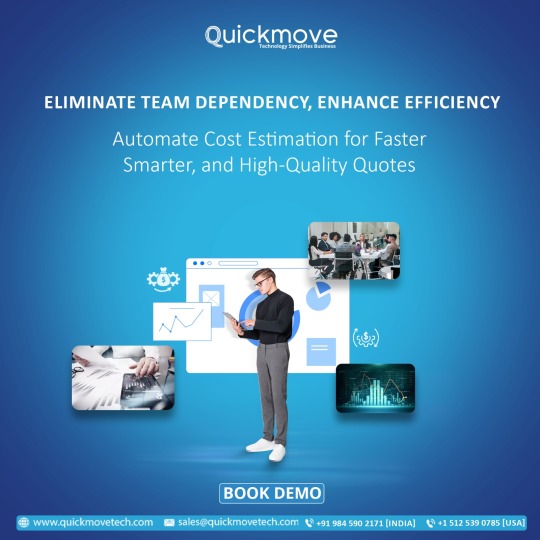
In the fast-paced world of logistics and freight forwarding, accuracy and efficiency are paramount. One of the most critical aspects of the industry is cost estimation, which traditionally relies heavily on the expertise of seasoned team members. However, with the advent of freight forwarding software and cloud-based freight software, the industry is witnessing a transformative shift. One such groundbreaking feature is Automatic Costing, which is redefining how businesses prepare quotes, manage costs, and streamline operations.
The Traditional Challenge: People Dependency in Cost Estimation
In the past, preparing accurate cost estimates for freight forwarding quotes was a time-consuming process that depended on the experience and expertise of team members. While experienced professionals bring valuable insights, this reliance on human input often leads to inconsistencies, delays, and increased operational costs. Moreover, as the logistics industry grows more complex, the margin for error in cost estimation becomes even slimmer.
Enter Automatic Costing, a feature that eliminates these challenges by leveraging advanced algorithms and data-driven insights to provide accurate, real-time cost estimations.
What is Automatic Costing in Freight Forwarding Software?
Automatic Costing is an innovative feature integrated into modern logistics software and freight software. It automates the process of calculating costs for freight forwarding services, ensuring that businesses can generate precise quotes quickly and efficiently. By removing the need for manual calculations, this feature not only saves time but also enhances the accuracy of cost estimations.
Key Benefits of Automatic Costing:
Reduced People Dependency:-With Automatic Costing, businesses no longer need to rely solely on experienced team members for cost estimation. The software does the heavy lifting, ensuring consistency and accuracy across all quotes.
Faster Quote Preparation:- Time is money in the logistics industry. Automatic Costing enables businesses to prepare quotes in a fraction of the time, allowing them to respond to client inquiries faster and secure more deals.
Improved Accuracy:- By leveraging real-time data and advanced algorithms, Automatic Costing minimizes the risk of human error, ensuring that quotes are as accurate as possible.
Cost Savings:- Automating the costing process reduces operational costs associated with manual calculations and rework due to errors.
Enhanced Competitiveness:- With more accurate and timely quotes, businesses can stay ahead of the competition and build stronger relationships with clients.
Why Automatic Costing is a Must-Have for Freight Forwarding Companies
In today’s competitive logistics landscape, staying ahead requires embracing technology that enhances efficiency and accuracy. Automatic Costing is not just a feature; it’s a strategic advantage that empowers freight forwarding companies to:
Streamline Operations:- By automating repetitive tasks, businesses can focus on core activities like customer service and business development.
Increase Profit Margins:- Accurate costing ensures that businesses don’t under quote or over quote, protecting their profit margins.
Scale Efficiently:- As businesses grow, the ability to generate quotes quickly and accurately becomes even more critical. Automatic Costing makes scalability seamless.
Conclusion: Embrace the Future of Freight Forwarding with Automatic Costing
The logistics industry is evolving, and businesses that leverage technology like Automatic Costing in their freight forwarding software will undoubtedly lead the pack. By reducing people dependency, improving accuracy, and saving time and costs, this feature is a game-changer for freight forwarders worldwide.
Whether you’re a small logistics provider or a global freight forwarding company, investing in cloud-based freight software with Automatic Costing capabilities is a step toward a more efficient, competitive, and profitable future.
Ready to transform your freight forwarding operations? Explore the power of Automatic Costing today and take your business to new heights!
#logistics software#freight forwarding software#freight software#software for freight forwarding software
0 notes
Text
youtube
𝗖𝗹𝗼𝘂𝗱𝗟𝗲𝗮𝗽 𝗘𝗥𝗣 𝗜𝗻𝘁𝗲𝗴𝗿𝗮𝘁𝗲𝗱 𝗦𝗵𝗶𝗽𝗽𝗶𝗻𝗴 𝗦𝗼𝗹𝘂𝘁𝗶𝗼𝗻𝘀. Streamline your logistics and shipping operations with CloudLeap's ERP-Integrated Shipping Solutions! Seamlessly connect your ERP system for real-time parcel and LTL shipping, tracking, and cost optimization. Watch the video to see how we simplify logistics and shipping for your business!
#shipping software#shipping solutions#logistics software#multi carrier shipping software#cloud shipping#supply chain#shipping system#ERP Integrated Shipping Software#CloudLeap#Piyovi#Shipping System#Youtube
0 notes
Text
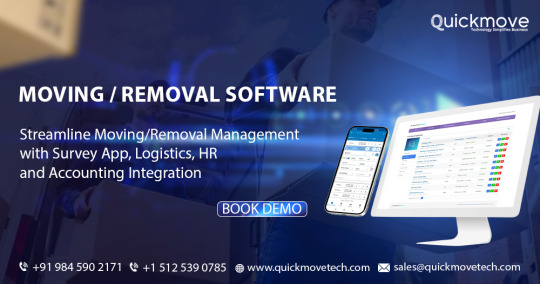
Book a free demo of the best Moving/Removal software - https://www.quickmovetech.com/moving-removal-software/
0 notes
Text
Warehouse Management Software London
Efficient Warehouse Management Software in London for Streamlined Operations
Discover how our cutting-edge Warehouse Management Software in London can streamline your operations, optimize inventory, and boost overall productivity. Perfect for small and large warehouses alike.
Warehouse Management Software London

0 notes